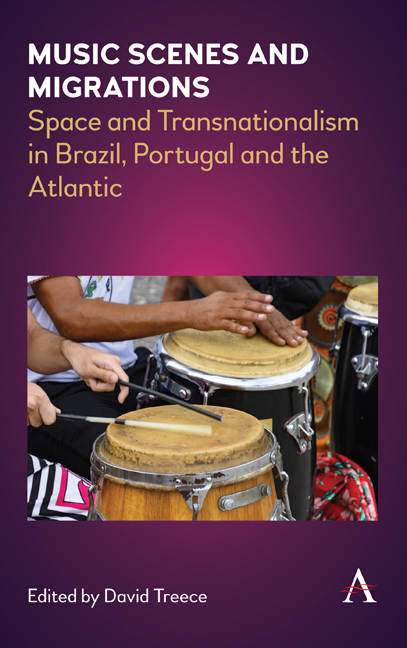Book contents
- Frontmatter
- Contents
- List of Illustrations
- Acknowledgements
- Introduction
- Part 1 Colonial and Postcolonial Transnationalisms, Migrations and Diasporas
- Part 2 Relocating Rio de Janeiro
- Part 3 Demetropolitanizing the Musical City: Other Scenes, Industries, Technologies
- Notes on Contributors
- Notes
- References
- Index
Chapter 4 - Lusofonia as Intervention: PostcolonialIntercultural Traffic in Lusophone Hip HopEvents
Published online by Cambridge University Press: 20 January 2022
- Frontmatter
- Contents
- List of Illustrations
- Acknowledgements
- Introduction
- Part 1 Colonial and Postcolonial Transnationalisms, Migrations and Diasporas
- Part 2 Relocating Rio de Janeiro
- Part 3 Demetropolitanizing the Musical City: Other Scenes, Industries, Technologies
- Notes on Contributors
- Notes
- References
- Index
Summary
This article traces aspects of Lusophone hip hop inLisbon over the past twenty years. In an attempt toreconcile incipient emic notions of lusofonia with the newmulticulturalism, the Portuguese rap movementlaunched compilations such as Rapública (1994) and Tejo Beat (1998), andparticipated in the documentary Lusofonia, a (R)evolução (2006). Icontend that, despite cultural policies promotingcontact between cultures under umbrella terms suchas lusofonia,interculturalism and diversity, expressions ofsocial and cultural racism still mark Portuguesesociety. Such subaltern mechanisms of otheringrender a decolonial approach politically andepistemologically necessary.
Through a brief discussion of festivals, celebratoryevents and recordings, I consider collaborativemusic performances for intervention purposes,whether in opposition to racism and xenophobia, oragainst censorship and oppression. My findings showthat notions of lusofonia are being used emically torelate to ideas of fusion. Lusophone rappers inparticular have increasingly addressed newconfigurations of race, social class and nation inthe emerging Portuguese postcolonial context. Basedon fieldwork, I argue that the discourse concerninghistorical and cultural ties between Lusophonecountries is taking on a growing significance forLusophone cultural agents, addressing issues ofcultural heritage, sustainability and participatorycitizenship in a postcolonial environment ofreconciliation.
Introduction
Since the mid-1990s, Portuguese institutions,politicians, scholars, journalists, voluntaryassociations, cultural entrepreneurs, musicians andtheir audiences have increasingly used the notion oflusofonia to referto what they perceive as cultural identitiesassociated with Portuguese-speaking countries,regions or cities, as well as Portuguese-speakingdiaspora communities across the world. Grounded in alinguistic definition, lusofonia also designates a political,economic and cultural space. Although its historicalroots go back 4to Portuguese colonialism (stretchingfrom the so-called Age of Discoveries up to theRevolution of 1974), the concept's contemporarymeaning originated in the Portuguese LanguageOrthographic Agreement (1990), gaining a newsignificance with increased migration fromPortugal's former African colonies to Lisbon in thepost-1974 era of independence. The organization ofinternational events such as 1994 Lisbon EuropeanCapital of Culture (Lisboa 94) and the 1998 LisbonWorld Expo (Expo’98), the creation of media channelsRDP África (1996) and RTP África (1998), and thefoundation of the transnational institution CPLP(Community of Portuguese Language Countries) in1996, all in Lisbon, inspired a large number ofinstitutional, associative and individualinitiatives that incorporated local Lusophonecultural expressions, both in and beyond thePortuguese capital.
- Type
- Chapter
- Information
- Music Scenes and MigrationsSpace and Transnationalism in Brazil, Portugal and the Atlantic, pp. 43 - 56Publisher: Anthem PressPrint publication year: 2020



